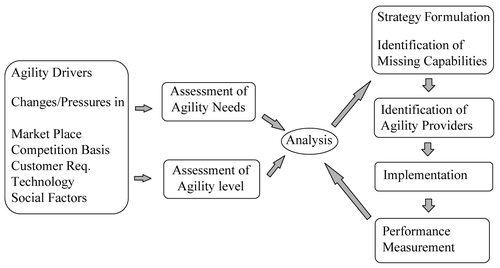
Could have a picture here
Agility, as a manufacturing strategy, provides enterprises with the capability to capitalise on dynamic and continuous changes in the business environment proactively and reactively. We were the first research group to formally define agility as a manufacturing strategy and to identify distinct categories of agility strategies. Traditionally, agility is considered as a holistic concept.
We have discovered a taxonomy which classifies three discrete agility strategies each with different characteristics, business cases and ways for delivery. Our taxonomy and delivery methodology have been applied in industry through 15 Knowledge Transfer Partnerships and have helped over 20 UK companies develop and implement agility strategies, generating significant social economic benefit. Current research is investigating how agility strategies change in the present business environment and how companies adopting different strategies structure and manage their supply chains.
Projects
- Developing a Strategic Framework for the Successful Implementation of Additive Manufacturing: A life-cycle study
Abstract: Additive Manufacturing (AM) remains a promising process innovation which to date has not yet emerged as an established manufacturing process. There remains a significant gap of knowledge regarding the implementation of AM and this area has been identified as key to increasing the adoption and diffusion of these technologies. This research aims to investigate the process of AM implementation over its life-cycle. In line with the characteristics of implementation research it is primarily concerned with identifying and developing an understanding of the factors influencing the process of implementation and its success and failure. - A study of factors affecting supply chain quality
Abstract: Despite a significant amount of research literature on quality management and supply chain management, there is not yet a definition of what is meant by supply chain quality and there is little understanding about this subject. How can quality in supply chains be defined, measured and improved? Based in existing theories of quality and performance management and supply chain management, this exploratory research aims to identify the meaning of and factors contributing to supply chain quality in an attempt to answer the question of how to achieve supply chain quality. - Application of failure modes and effects analysis (FMEA) as a risk assessment technique in the implementation of real-time location systems to reduce emergency department overcrowding (Funded by the Government of Saudi Arabia)
Abstract:In this research, the author proposes to apply FMEA to the radio-frequency identification (RFID) system in use by the Royal Military Hospital. This will seek to establish the reasons behind the perceived success or failure of the technology through in-depth case studies with those responsible for the implementing and using the system. This research aims to develop a clearer understanding of the role and the benefits of RFID and other real-time locating systems in hospital settings. In addition, this research will provide case information that can be used by other healthcare institutes to improve their RFID implementation programs. - A taxonomy of agility strategies and supply chain management
Abstract: Since the turn of the century, manufacturing industry has witnessed significant structural changes across the globe. The increased intensity of global outsourcing and global marketing, concerns over rising energy and materials costs, and problems with the quality and security of the global supply chain networks are some of the characteristics of the new competitive environment. Agility, as a manufacturing strategy that aims to provide enterprises with competitive capabilities to prosper from dynamic and continuous changes in the business environment, reactively and proactively, is still the prevailing strategy, but its scope may have changed with the changing situation. This project aims to identify what types of agility strategies exist in today marketplace and what supply chain design, integration and management practices are used to support each of the agility strategies. The results are expected to be able to provide guidance to manufacturing companies in their design, management, and continuous improvement of supply chains. - Advanced Process Failure Modes and Effects Analysis (FMEA) for SMEs (Funded by Graphic plc)
Abstract: Process FMEA is a tool used to anticipate failures in manufacturing processes, usually involving groups of people involved with the process. This work is developing a new approach to Process FMEA that modifies the learning on processes to drastically reduce the time spent on the FMEA, to bring the approach into the reach of smaller companies whose resources are limited.

